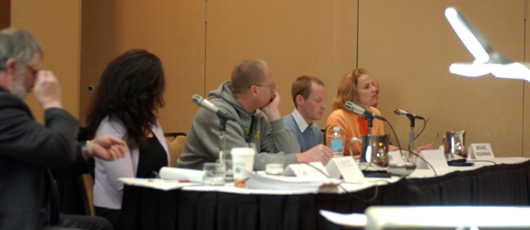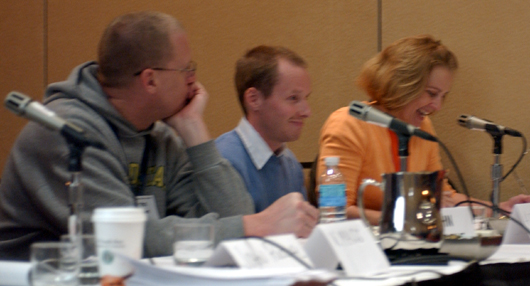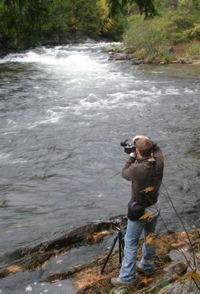
From left to right: John Russial, University of Oregon; Valerie Mass, The Denver Post; John Boogert, Rocky Mountain News; Andrew Knapp, The Offlede (and FLORIDA TODAY); and Amy Hubbard, the Los Angeles Times. Michael Roehrman of The Wichita Eagle is hiding behind Hubbard. Boogert gave Mass a difficult time throughout the session because they're cutthroat, but friendly competitors.

Photos by Daniel Hunt, Flickr
Several weeks ago, after being in my first full-time job for six months, I was preparing for the American Copy Editors Society national conference. It would be my first.
So when University of Oregon professor John Russial asked me to participate in a panel about online editing, I was hesitant to accept. I told him that I was inexperienced and relatively immature, but he still thought I would be "a good addition." So I accepted. And I'm glad.
I presented my opening statement alongside Amy Hubbard, the copy desk chief for Travel, Real Estate and Books at the Los Angeles Times, and John Boogert, Internet news editor at the Rocky Mountain News. Even Hubbard was nervous when she gave her speech, so that put me at ease.
Russial first presented his study about the editing of online products at newspapers. He surveyed 210 publications and divided them into three size categories. I don't have many details, but these are a few things I jotted down.
Twenty percent of the largest newspapers said they don't edit online stories.
Of all papers that do edit online, there's a 2-1 ratio of editors who have editing experience to those who don't. But copy editors would say "editing" experience doesn't mean "copy editing" experience.
Of the newspapers that don't edit online stories, 59 percent said they don't because it delays posting, and 42 percent said they don't have enough employees.
But the most striking result in Russial's study is that smaller newspapers are, for the most part, doing just as well as the larger ones when it comes to online editing.
For example, Michael Roehrman of The Wichita Eagle, which is about the size of FLORIDA TODAY, said that all stories are given to the day or night copy desk to be edited, then sent to the Web site. The Eagle was surveyed in Russial's study. FLORIDA TODAY was, too, and that's why Russial asked me to join the panel.
Represent!
At FLORIDA TODAY, online producers are responsible for editing and for the technical maintenance of the site's function and aesthetics.
My opening statement about how editing is done in Brevard County was well-received. People came up to me several times for the rest of the conference to talk about FLORIDA TODAY. I was a proud ambassador.
To look at my speech, click on either the Word version or the PDF version.
Editing blogs
In Russial's sample, one of three newspapers did not edit blogs. Of the sites that didn't edit blogs, 70 percent said blogs were solely the writer's responsibility.
Hubbard said the Times assigns blogs to copy editors to edit whenever they have time. It's not a regular part of their duties. This seems like a good way to handle blog editing.
Some people argue against blog editors because they risk taking away the writer's voice. But what about accuracy? What about embarrassing errors? Andy Bechtel of the University of North Carolina talks more about blog editing here.
Copy editors don't edit FLORIDA TODAY blogs. Instead, an assigning editor oversees them, so there is some quality control.
It isn't always practical to have a copy editor for a blog, such as in the case of FLORIDA TODAY's space team. Some blogs are 24-hour features that are updated from home or from the field. For example, our NASA reporters blog from Mission Control in Houston at 3 a.m. when no one is on duty in Florida.
The only thing that I ask, however, is that bloggers learn to write headlines.
Session information
- Title: "Online Copy Editing: What’s Being Done, What Could Be Done"
- Time: 10:45 a.m. to 12:15 p.m. Friday
- Panelists: John Russial, University of Oregon; John Boogert, Rocky Mountain News; Amy Hubbard, Los Angeles Times; Michael Roehrman, Wichita Eagle; Valerie Mass, Denver Post; Andrew Knapp, Florida Today
- Description: "A look at who’s editing what online, and how little copy actually is being edited before being posted. The problem runs from small to large publications. But some newsrooms have created online copy editing positions, and others are experimenting with schedules, desk structures and other things as a way to get online copy read."



1 comment:
Post a Comment